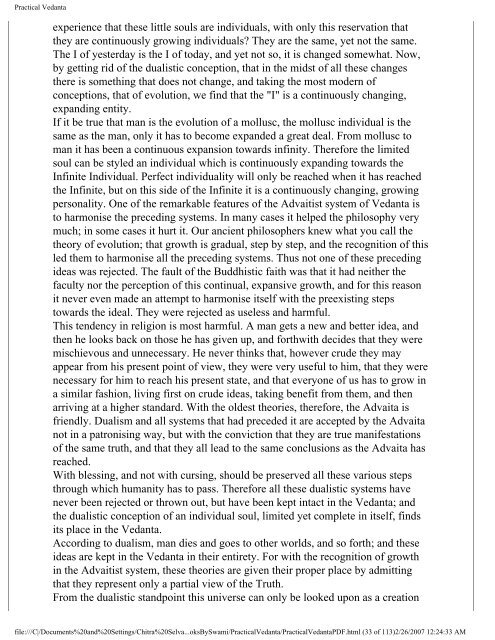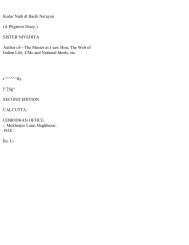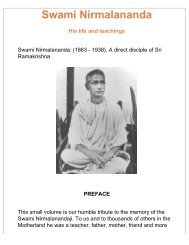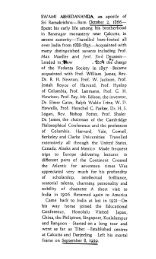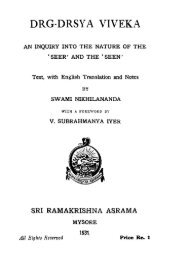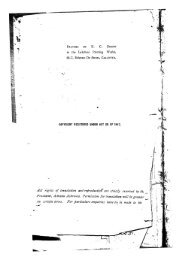<strong>Practical</strong> <strong>Vedanta</strong>the perception of the body does not remain. None can get the perception of theSelf without his perception of the body having vanished, none can get perceptionof the substance without his perception of the qualities having vanished.The ancient illustration of Advaita, of the rope being taken for a snake, mayelucidate the point a little more. When a man mistakes the rope for a snake, therope has vanished, and when he takes it for a rope, the snake has vanished, and therope only remains. The ideas of dual or treble existence come from reasoning oninsufficient data, and we read them in books or hear about them, until we comeunder the delusion that we really have a dual perception of the soul and the body;but such a perception never really exists. The perception is either of the body or ofthe soul. It requires no arguments to prove it, you can verify it in your own minds.Try to think of yourself as a soul, as a disembodied something. You will find it tobe almost impossible, and those few who are able to do so will find that at the timewhen they realise themselves as a soul they have no idea of the body. You haveheard of, or perhaps have seen, persons who on particular occasions had been inpeculiar states of mind, brought about by deep meditation, self-hypnotism,hysteria, or drugs. From their experience you may gather that when they wereperceiving the internal something, the external had vanished for them. This showsthat whatever exists is one. That one is appearing in these various forms, and allthese various forms give rise to the relation of cause and effect. The relation ofcause and effect is one of evolution — the one becomes the other, and so on.Sometimes the cause vanishes, as it were, and in its place leaves the effect. If thesoul is the cause of the body, the soul, as it were vanishes for the time being, andthe body remains; and when the body vanishes, the soul remains. This theory fitsthe arguments of the Buddhists that were levelled against the assumption of thedualism of body and soul, by denying the duality, and showing that the substanceand the qualities are one and the same thing appearing in various forms.We have seen also that this idea of the unchangeable can be established only asregards the whole, but never as regards the part. The very idea of part comes fromthe idea of change or motion. Everything that is limited we can understand andknow, because it is changeable; and the whole must be unchangeable, becausethere is no other thing besides it in relation to which change would be possible.Change is always in regard to something which does not change, or which changesrelatively less.According to Advaita, therefore, the idea of the soul as universal, unchangeable,and immortal can be demonstrated as far as possible. The difficulty would be asregards the particular. What shall we do with the old dualistic theories which havesuch a hold upon us, and which we have all to pass through — these beliefs inlimited, little, individual souls?We have seen that we are immortal with regard to the whole; but the difficulty is,we desire so much to be immortal as parts of the whole. We have seen that we areInfinite, and that that is our real individuality. But we want so much to make theselittle souls individual. What becomes of them when we find in our everydayfile:///C|/Documents%20and%20Settings/Chitra%20Selva...oksBySwami/<strong>Practical</strong><strong>Vedanta</strong>/<strong>Practical</strong><strong>Vedanta</strong>PDF.html (32 of 113)2/26/2007 12:24:33 AM
<strong>Practical</strong> <strong>Vedanta</strong>experience that these little souls are individuals, with only this reservation thatthey are continuously growing individuals? They are the same, yet not the same.The I of yesterday is the I of today, and yet not so, it is changed somewhat. Now,by getting rid of the dualistic conception, that in the midst of all these changesthere is something that does not change, and taking the most modern ofconceptions, that of evolution, we find that the "I" is a continuously changing,expanding entity.If it be true that man is the evolution of a mollusc, the mollusc individual is thesame as the man, only it has to become expanded a great deal. From mollusc toman it has been a continuous expansion towards infinity. Therefore the limitedsoul can be styled an individual which is continuously expanding towards theInfinite Individual. Perfect individuality will only be reached when it has reachedthe Infinite, but on this side of the Infinite it is a continuously changing, growingpersonality. One of the remarkable features of the Advaitist system of <strong>Vedanta</strong> isto harmonise the preceding systems. In many cases it helped the philosophy verymuch; in some cases it hurt it. Our ancient philosophers knew what you call thetheory of evolution; that growth is gradual, step by step, and the recognition of thisled them to harmonise all the preceding systems. Thus not one of these precedingideas was rejected. The fault of the Buddhistic faith was that it had neither thefaculty nor the perception of this continual, expansive growth, and for this reasonit never even made an attempt to harmonise itself with the preexisting stepstowards the ideal. They were rejected as useless and harmful.This tendency in religion is most harmful. A man gets a new and better idea, andthen he looks back on those he has given up, and forthwith decides that they weremischievous and unnecessary. He never thinks that, however crude they mayappear from his present point of view, they were very useful to him, that they werenecessary for him to reach his present state, and that everyone of us has to grow ina similar fashion, living first on crude ideas, taking benefit from them, and thenarriving at a higher standard. With the oldest theories, therefore, the Advaita isfriendly. Dualism and all systems that had preceded it are accepted by the Advaitanot in a patronising way, but with the conviction that they are true manifestationsof the same truth, and that they all lead to the same conclusions as the Advaita hasreached.With blessing, and not with cursing, should be preserved all these various stepsthrough which humanity has to pass. Therefore all these dualistic systems havenever been rejected or thrown out, but have been kept intact in the <strong>Vedanta</strong>; andthe dualistic conception of an individual soul, limited yet complete in itself, findsits place in the <strong>Vedanta</strong>.According to dualism, man dies and goes to other worlds, and so forth; and theseideas are kept in the <strong>Vedanta</strong> in their entirety. For with the recognition of growthin the Advaitist system, these theories are given their proper place by admittingthat they represent only a partial view of the Truth.From the dualistic standpoint this universe can only be looked upon as a creationfile:///C|/Documents%20and%20Settings/Chitra%20Selva...oksBySwami/<strong>Practical</strong><strong>Vedanta</strong>/<strong>Practical</strong><strong>Vedanta</strong>PDF.html (33 of 113)2/26/2007 12:24:33 AM
- Page 1 and 2: Practical VedantaPractical VedantaP
- Page 3 and 4: Practical Vedantaworld. If I am a s
- Page 5 and 6: Practical Vedantadifference is only
- Page 7 and 8: Practical VedantaThe ideal of faith
- Page 9 and 10: Practical Vedantamoment of our live
- Page 11 and 12: Practical Vedantaof the Christs and
- Page 13 and 14: Practical Vedanta"This life is Brah
- Page 15 and 16: Practical Vedantadark fifteen days,
- Page 17 and 18: Practical Vedantalife. This is the
- Page 19 and 20: Practical Vedantaeverything would b
- Page 21 and 22: Practical Vedantait is only through
- Page 23 and 24: Practical Vedantawhich is that subt
- Page 25 and 26: Practical Vedantanoumenon and pheno
- Page 27 and 28: Practical Vedantato which is the be
- Page 29 and 30: Practical VedantaAbsolute.The finit
- Page 31: Practical Vedantawhich is not the q
- Page 35 and 36: Practical Vedantafulfilled. The Jiv
- Page 37 and 38: Practical Vedantabetween the pure r
- Page 39 and 40: Practical Vedantacome out straight.
- Page 41 and 42: Practical Vedantawar with one anoth
- Page 43 and 44: Practical Vedantanobody could under
- Page 45 and 46: Practical VedantaMy idea, therefore
- Page 47 and 48: Practical Vedantathe same methods.
- Page 49 and 50: Practical Vedantavarious minds, all
- Page 51 and 52: Practical Vedantabrotherhood; but t
- Page 53 and 54: Practical Vedantabrotherhood, but w
- Page 55 and 56: Practical Vedantawe all go with ves
- Page 57 and 58: Practical Vedantareason. What can y
- Page 59 and 60: Practical Vedantabeen preached in t
- Page 61 and 62: Practical Vedantathe husband kisses
- Page 63 and 64: Practical Vedantaof the knowledge a
- Page 65 and 66: Practical Vedantafor those who only
- Page 67 and 68: Practical Vedantasun exists because
- Page 69 and 70: Practical Vedantaof death was pleas
- Page 71 and 72: Practical VedantaGod. We must learn
- Page 73 and 74: Practical Vedantaa plague comes, it
- Page 75 and 76: Practical VedantaAtman? "As with a
- Page 77 and 78: Practical Vedantathat immortal One,
- Page 79 and 80: Practical Vedantaand the third egoi
- Page 81 and 82: Practical VedantaWitness of the uni
- Page 83 and 84:
Practical VedantaPractical Vedanta1
- Page 85 and 86:
Practical Vedantaeternal ; every ot
- Page 87 and 88:
Practical Vedantafaculty, Buddhi, w
- Page 89 and 90:
Practical VedantaPractical Vedanta1
- Page 91 and 92:
Practical Vedantastepping-stone to
- Page 93 and 94:
Practical Vedantarecognition? Findi
- Page 95 and 96:
Practical Vedantasentient." This is
- Page 97 and 98:
Practical Vedantaessentially differ
- Page 99 and 100:
Practical Vedantaexistence is limit
- Page 101 and 102:
Practical Vedantalive, for I am lif
- Page 103 and 104:
Practical Vedantasee from Kapila's
- Page 105 and 106:
Practical Vedantalimitation, but th
- Page 107 and 108:
Practical Vedantaperfect, infinite,
- Page 109 and 110:
Practical Vedantaindividuality, of
- Page 111 and 112:
Practical Vedantarepeat [something]
- Page 113:
Practical Vedantaperson who dies in


